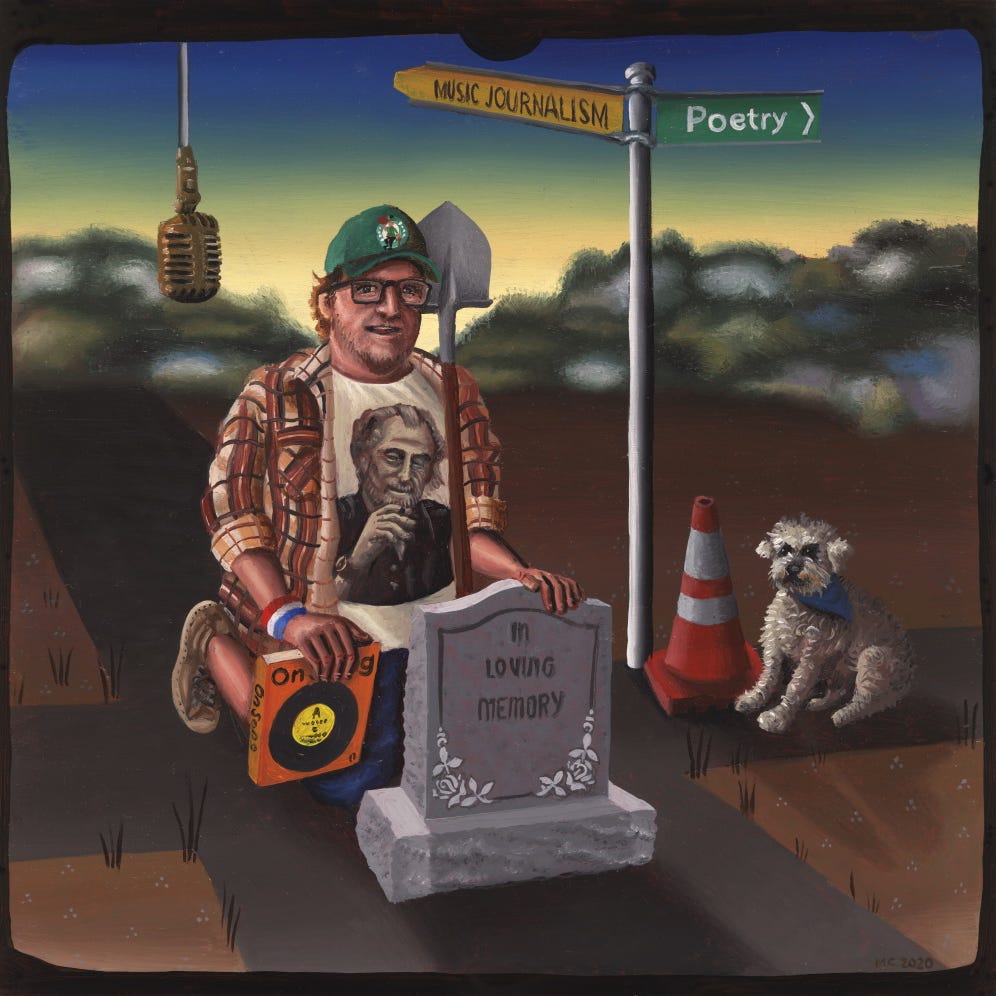The Best Music Book of the Year Is Here And I Must Have It!
Wednesday is about books and writing. And reading. There's your title up above. Why you need anything else?
I think my transition away from being ‘just’ a music writer, out of even being a music writer was confirmed via email this morning. And there’s no panic attached to this by the way. It comes, if anything, as a relief.
I’m still signed up to a bunch of music-related mailing lists. Today, Pitchfork shared its 10 Best Music Books of 2023. Dear reader of these newsletters, I must report I’ve not read a single one!
Don’t get me wrong, it’s a great list. It looks fantastic. I’ve heard of several of the books - and in a perfect world I’d have read half of them by now, at least. But reading arrives in stolen moments these days. And ‘big’ reads are reserved for holidays.
There are a bunch of music books I have read this year, and a couple I’ve read probably should have been on this list (Sly Stone’s memoir for instance). But I definitely added most of this Top 10 to my aspirational ‘long list’. And of course there was one on there that I’ve already earmarked to read in my recent dispatch around summer holiday memoirs to catch up on.
But there is one book on the Pitchfork list I’m considering an absolute must.
Will Hermes’ book about Lou Reed took my eye just last week at Unity Books, and I’ll be surprised if I can make it out the door on my next visit without a copy.
I love reading about Lou Reed. Peter Doggett’s Growing Up In Public, and Jeremy Reed’s Waiting For The Man, and Victor Bockris’ Lou Reed: The Biography and Uptight: The Story of The Velvet Underground were all books that I loved so much as a teenager. They weren’t all great, not all the way through. But they were important reading experiences. Each book got me closer to the subject in a way, made me want more from the music, urged me to listen closer - and helped hook me in for a lifetime of reading about music.
There are better music bios than any of those I just listed, but those ones - all on the same subject - are among the most important to me.
After that, I stopped reading about Reed for a while. I didn’t need to. I had the music. And was feeling nice and close to it. And I had all the other bands and artists to read about - some that intersected, many that didn’t at all. I was happy either way.
When Lou Reed died, I had a go at memorialising him but the truth is I was about as removed from his world as I’d ever been. I hadn’t really listened to him in years, of course I knew the music very well still, but felt no need to delve, and little connection after all those years.
And then, more recently, I’ve read a couple of the newer books (Aidan Levy’s Dirty Blvd.: The Life and Music of Lou Reed, Mick Wall’s Lou Reed: The Life, and Lou Reed: The Last Interview and Other Conversations) and that had me going back through the catalogue, to find some new favourites and to revisit many of the old delights.
The Velvet Underground of course forever holds appeal. That finite catalogue of music, made as angry art statement, sometimes feels like all that matters. The Beatles of indie-rock and alternative music…
An interesting thing has happened in recent years though. The cancellation of so many of the dinosaurs has, thus far somehow largely evaded the rock’n’roll scene. Do we need music so much to help us form our identity that we’re forever willing to turn a blind eye to Jimmy Page kidnapping a teenager and holding her for sex; to David Bowie also having sex with underaged women, quite possibly without their consent? There have certainly been allegations. But where the movie and TV stars and writers and visual artists sometimes get their day in court, the monsters of rock roam free. We needed their music to shape our worlds so we’re not quite ready to retrospectively put their hideous lifestyle choices and behaviour that was never appropriate but forever excused under any sort of microscope. Is that how it’s going to be?
Wildly, Lou Reed’s Walk on the Wild Side had its own day in court. Some younger music listeners took offence to the song’s language - protesting at the freedom with which he changed pronouns. It didn’t take too long for the arguments and attempts to ‘ban’ the song to be exposed as one of the sillier attempts at cancellation. Reed was an ally long before there were rainbow badges. Reed walked the walk (on that wild side) and, beyond that he talked the talk. He was shining a light. He might, ultimately, have been a tourist of ‘the scene’, but he was writing about ‘taboo’ subjects at a time when it showed nothing but bravery. He was one of the good ones. On the right side of the argument.
A wave of new texts has arrived supporting this line of thought.
Transformer: A Story of Glitter, Glam Rock, and Loving Lou Reed is as much a personal memoir by Simon Doonan as it is any examination of the music, but it puts the case for not only Reed’s queerness but his exploration of the scenes, his highlighting of a culture as it was still burgeoning, living far more in the shadows than might now be the case.
The writer and musician Ezra Furman does a similar job in his study of just Reed’s album Transformer for the popular 33 1/3 series, blending his own biography, his coming of age story as a fan of the music, with a study of the creation of the central work.
Even though we’re not seeing the cancellation of the rock stars, many of them are being put under the spotlight - and not in the way they’ve always loved. The stories are being outed, and sometimes they are being re-examined as a result.
Well, with Reed, a kinder, gentler lens is being applied. We know about the electric shock therapy he was subjected to when he told his parents he might be gay. (It’s in his mid-70s gem of uneasy listening, Kill Your Sons as well as being a part of every biography that’s been printed). We know Reed dated a trans woman (Rachael) and wrote one of his most beautiful love songs with a dedication to her (Coney Island Baby sings of “the glory of love” and then has a dedication, “I’d like to send this one out to Lou and Rachael” before concluding, “Man, I swear I’d give the whole thing up for you”).
It’s known that Reed was often difficult, cantankerous in the extreme, his battles with the press, his boredom, his spiky, spiteful, or just indifferent interviews the stuff of legend. But the link between what he endured, and how he was made to feel, and then how it manifested in his own behaviour has, oddly, only ever been looked at with the flimsiest of Psychology 101 flyers.
But then, it always seemed strangely compelling that he settled with the artist Laurie Anderson. That they had a decade and a half or so of bliss, of calm, of peace. Reed practiced martial arts, released meditation music and seemed, finally at peace, with himself, and with this world.
And then he died.
The recent books have focussed far more on his ties to the rainbow community, the awareness he raised, the way he worked as an ally for the scene, as a lightning rod of sorts.
The Will Hermes book is said to take all of that, and also look deeply at the New York that Reed reflected, and the New York that made him. Hermes is a fantastic writer, so the mere idea he would put together a tome on Reed had me interested as soon as I saw it. But the reviews are gushing. This is the book to read. This is the critical re-examination of Lou Reed that we need, and that many of us have wanted. It doesn’t excuse his behaviour. It is said to go way deeper. It explains the reasons for it.
I am buying this book today.
I might not make it through the rest of Pitchfork’s Top 10, I might have handed in my Music Writer card a few years ago, and it’s finally been confirmed, but I consider this book the new must-read of the year.
Will report back after combing its pages.





Thanks for the recommendation - looks like you've sold me on the book!
I've almost finished Howard Fishman's Connie Converse bio and it's been blowing me away, it's an amazing exercise in doing justice to his obsession and her life and work, full of stunning unexpected punches to the gut. What does it mean to be so far ahead of your time that there's not even the confort of knowing you are?